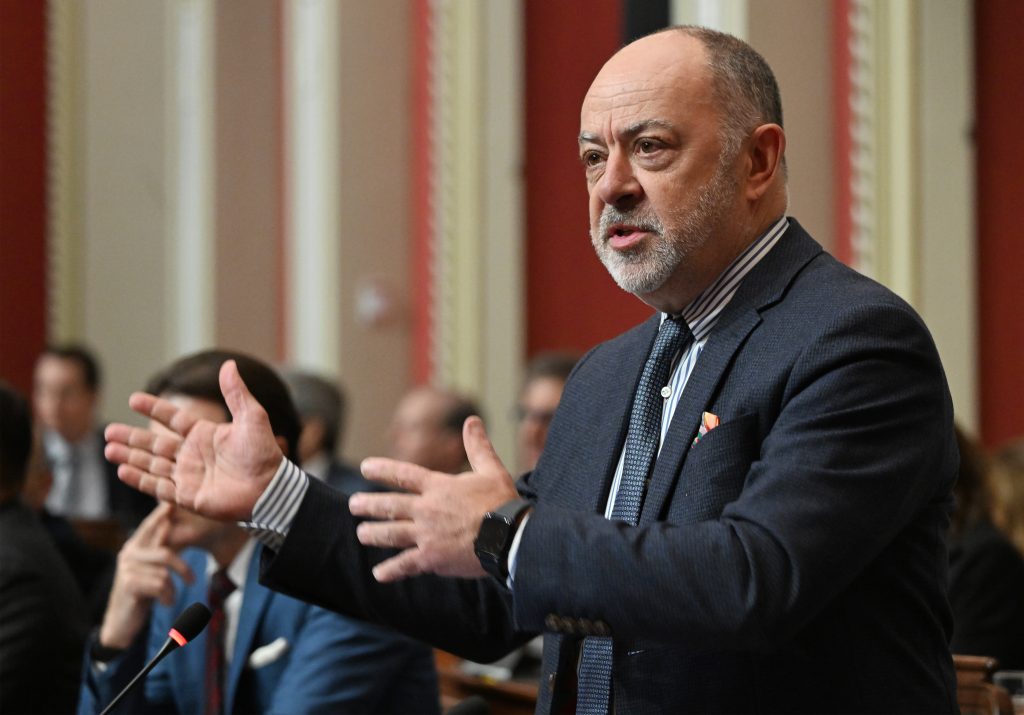Quebec Health Minister tables amendments to Bill 83 to tackle doctors’ comings and goings

Posted April 1, 2025 12:42 pm.
Last Updated April 1, 2025 5:46 pm.
Health Minister Christian Dubé wants to strengthen his Bill 83, which aims to stem the exodus of doctors to the private sector.
On Tuesday, Dubé tabled a series of amendments that would complicate the “comings and goings” of doctors temporarily disaffiliating from the public system to go into private practice.
It proposes that all doctors obtain authorization from Santé Québec to disaffiliate from the public network. At present, all they have to do is inform the Régie de l’assurance maladie du Québec (RAMQ) within certain time limits.
“There are about 150 doctors, particularly specialists, who go back and forth,” explained the Minister on Tuesday, the first day of Bill 83’s detailed study.
“You’re going to tell me 150 doctors isn’t a lot, but 150 doctors who don’t do surgeries for 60 days for the public, that can make huge differences in our waiting list,” he added.
Santé Québec would then have the task of assessing the relevance of requests from doctors wishing to work in the private network, explained the Minister.
Each request would be analyzed according to the following criteria:
- a sufficient number of physicians must be practicing in public establishments in the physician’s region;
- his or her departure must not have a negative impact on patients in the region;
- the public network’s inability to put this physician to work in private establishments must be taken into account.
“Quebecers invest massively in the healthcare network, spending over $60 billion a year. I think they are entitled to have access to a doctor,” emphasized Dubé.
In its initial form, Bill 83 would have required all new doctors to start their practice and remain part of Quebec’s public network for at least five years before being allowed to practice in the private sector.
Failure to do so would result in a fine of up to $100,000 per day per act. During public consultations in February, associations of young doctors had deemed the idea “discriminatory”.
On Tuesday, Dubé said he wanted to cast a wider net with his bill, out of a concern for “fairness” towards young doctors.
According to the figures he presented, of the 22,011 doctors in Quebec, over 820 are currently working in the private network, representing an increase of over 80 per cent compared to the same date in 2020.
In the last three months, nearly 60 more doctors have disaffiliated from the public network, in addition to the 150 doctors, including 145 specialists, who have alternated between the private and public networks in the last year.
Faced with this reality, the government is implementing “half-measures”, Liberal health spokesman André Fortin charged on Tuesday. “We’re pretty convinced that this isn’t the horse’s medicine we need,” he said.
Québec solidaire (QS) reacted in the same way, deploring the CAQ government’s lack of “political courage”.
“If we really wanted to put an end to the exodus of doctors to the private sector, there are two ways to do it: ban outright the move to the private sector, (…) or (…) cap the rates charged by the private sector,” said Vincent Marissal of QS.
“The very socialist Alberta is doing this. No less socialist Ontario does that. The comparison is not to our advantage here,” he added with a touch of irony.
Marissal also questioned whether Santé Québec would really want to prevent doctors from going into private practice, given the agency’s need to clear waiting lists.
“I’m stuck with the obligation to make sure there’s coverage in the public sector, (…) and on top of that, I’m going to have to release doctors to the private sector because my waiting lists are overrun and I have to deliver results.”
“I put myself in their shoes, it’s like squaring a circle,” he illustrated.
“The Minister’s avowed aim is to increase the private sector’s role in our network. The government can try to disguise itself as a lamb, but the wolf has well and truly entered the sheepfold,” reacted CSN President Caroline Senneville in a press release.
“Are the solutions proposed in the bill the right ones? We don’t think so,” said PQ MNA Pascal Paradis.
–This report by La Presse Canadienne was translated by CityNews








